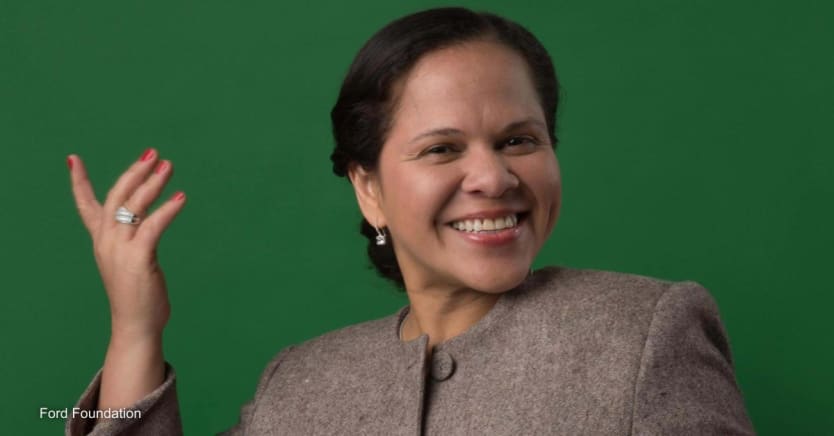
As Monica Aleman takes the reins as the Ford Foundation’s international program director for gender, racial, and ethnic justice, she wants to use “every tool in the toolbox” to advance a progressive agenda, including partnering with corporations and governments to highlight gender-based violence and social justice.
The program, known as GREJ-I and launched in 2019, focuses on reducing violence and structural inequalities based on gender, race, disability, or ethnicity by working with organizations around the world that are led by women and girls, especially in the global south. Issues like this have long been a priority for the foundation, which co-led a so-called action coalition on gender-based violence at the United Nations’ Generation Equality Forum in Paris last year. During the event, Ford pledged $420 million to address gender disparities.
GREJ-I has a $27 million annual budget, said Ford spokesperson Nicole Okai. It also has access to another $10.6 million from the foundation’s Building Institutions and Networks program, or BUILD — a $1 billion initiative that provides multiyear, unrestricted funding to civil society groups for operating support and “institutional strengthening,” including governance and leadership, Okai told Devex.
Though she isn’t planning any major shake-ups, Aleman told Devex she sees opportunities to expand GREJ-I’s reach beyond its current focus on grassroots groups. For example, the program can partner with the private sector and government.
“I have this hope of launching at least two different initiatives: one around the linkage between economic justice and reduction of violence, and another around healing and justice,” she said in an interview.
Aleman is working on ideas for Ford to establish public-private partnerships with policymakers and companies to bring more attention to gender-based violence, including in the workplace, she said.
The strategy for the program will be an extension of the work she started with her predecessor, Nicolette Naylor, when Aleman was a senior adviser to GREJ-I.
“Nicolette and I have had the benefit of being first and foremost very much value-aligned. And we understood what it meant to come from the global south, to come from outside of the U.S., and to operate effectively in a global institution that is based in the U.S.,” she said, referring to the commonalities between herself as a Nicaraguan and Naylor, a South African.
Laying that kind of groundwork ahead of a leadership change is helpful but not typical within philanthropy, said Hilary Pennington, Ford’s executive vice president of programs.
Foundations do transitions “especially badly,” but Naylor and Aleman have worked well together to create a strategy and an “ecosystem of partners,” Pennington said last month during an event on feminist leadership held at the Ford Foundation building in New York City.
Aleman, who spoke to Devex shortly before she was officially announced as the GREJ-I chief this month, is already a familiar face to many Ford grantees. She was previously a senior program officer for BUILD.
Prior to joining Ford in 2011, Aleman was the executive director of the International Indigenous Women’s Forum and founder of the Indigenous Women’s Fund. She has brought the experience and the connections from those organizations to her work at Ford, which was encouraged by foundation leadership, she said.
Ford colleagues have urged Aleman to leverage her background as a Latina and nonnative English speaker who did not attend “the most prestigious universities in the world” and to share that different perspective in meetings, she said.
This kind of encouragement is necessary for foundations that want to support increased representation of women — especially those from marginalized communities — among their leadership, she added.
It is important to gauge whether an institution’s leadership and trustees are committed to such an effort or whether they are “just using women of color as tokens of the change that we are trying to drive,” Aleman said.
Not every institution will be in the same place as Ford, which has spent many years focusing on equity in its recruitment, retention, and programming, she said. Nearly 80% of the foundation’s executive leadership is not white, and nearly 70% of these leaders are women, according to a 2021 Ford report on diversity, equity, and inclusion.
It’s critical to understand that different organizations might be in a different “moment” in terms of equity and will need to work at “the pace that is realistic for the change to take effect,” Aleman said.








